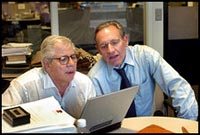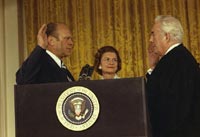| (insert your NIE or newspaper logo here) | Weekly Online LessonOnline Lesson ArchiveGrade Level: 7-10
|
Watergate Revisited
 After more than 30 years, the mystery man who spurred the downfall
of President Richard Nixon has emerged from the shadows.
After more than 30 years, the mystery man who spurred the downfall
of President Richard Nixon has emerged from the shadows.
Previously known only by the nickname "Deep Throat" - an agent deep within the executive branch - was an important, but anonymous, source for Washington Post reporters Carl Bernstein and Bob Woodward.
Their investigative stories focused national attention on a burglary that ultimately led to the impeachment of the Republican president and his prompt resignation in 1974.
Deep Throat's identity remained a mystery until Vanity Fair magazine released an exclusive feature story on May 30, 2005, revealing that the source was W. Mark Felt, second-in-command at the FBI at the time.
Referred to as "Watergate," the scandal began in June, 1972, several months before the presidential election. Five men were arrested for breaking into the headquarters of the Democratic National Committee, located at the Watergate hotel and office complex. The burglars were found with spying devices, and one of the men used to work for the CIA.
 The Post followed the story over the next several months,
periodically publishing articles citing evidence that the Watergate
break-in was directly linked to Nixon's re-election campaign. Felt,
the FBI's associate director, voluntarily - and risking his life - became
a critical player in helping the reporters confirm facts about the case
and providing substantial leads in their investigation.
The Post followed the story over the next several months,
periodically publishing articles citing evidence that the Watergate
break-in was directly linked to Nixon's re-election campaign. Felt,
the FBI's associate director, voluntarily - and risking his life - became
a critical player in helping the reporters confirm facts about the case
and providing substantial leads in their investigation.
The Post stories led to intense congressional and public scrutiny of the case, which included Senate hearings that were nationally televised.
The judicial branch became involved when Nixon refused to turn over taped conversations requested by investigators. The president claimed he had the right to refuse because of executive privilege. But the Supreme Court ruled that the tapes likely included evidence of illegal activity by government officials and that releasing the tapes did not threaten national security. Therefore, executive privilege could not be invoked in this case.
The tapes and other evidence prompted the House of Representatives to begin taking the necessary steps that would lead to the president's impeachment. Shortly after that, President Nixon announced his resignation.
For this week's lesson, you'll explore the depths of Watergate - the crimes, the investigations, and the people involved. You'll also learn about the impeachment process, and what kinds of secrets are shielded from public exposure by executive privilege and other protections and which are not.
Watergate Revealed
 Begin your investigation with The
Watergate Files, which you'll find at the Gerald R. Ford Library
& Museum.
Begin your investigation with The
Watergate Files, which you'll find at the Gerald R. Ford Library
& Museum.
Enter and read the introduction, then continue to the Watergate Trial Overview.
Next, meet the core People involved, including John Sirica, John Mitchell, G. Gordon Liddy, Sam Ervin, Richard Nixon, and The Burglars.
Check out the Documents and read the letter to Judge Sirica that helped unveil some of the deception involved.
Review the Timeline to get a sense of how the first part of the case unfolded. Also, watch the Film Reels to see how the Watergate break-in was covered by broadcast news at the time.
What role did John Dean play in the case? How did information published by the Post published compare with statements made by the president and the trial defendants, E. Howard Hunt and James McCord, Jr.?
Now, move on to the Senate Hearings.
After reading the overview, learn about some of the key players involved in the hearings, including John Dean, Bob Haldeman, John Ehrlichman, and Archibald Cox.
Also, review the section's Documents, Timeline, and Film Reels.
 What problems did the arrest of the burglars cause for Nixon
and his administration? In what ways did John Dean, and other close
associates of the president, shape how the case unfolded?
What problems did the arrest of the burglars cause for Nixon
and his administration? In what ways did John Dean, and other close
associates of the president, shape how the case unfolded?
As you've learned, discovery of Nixon's taped conversations came to light during the Senate Hearings. So began The Battle for the Tapes, which investigators believed would prove critical to the case.
Read the overview, meet some additional People involved - Gerald Ford and Robert Bork - and open the related Documents, follow the Timeline, and watch the Film Reels.
What steps did Nixon take in trying to keep the tapes from being handed over? Why did Nixon want Archibald Cox fired? What happened during the "Saturday Night Massacre" and why? In what ways did these events affect the presidency?
With Nixon's release of the tapes, the president and his administration suffered further Trials and Tribulations.
As the overview explains, the legal heat got hotter and the public got a taste of the real Nixon through the broadcast of some of the taped conversations. Review the Timeline and Film Reels for a sense of how public opinion of Nixon had clearly shifted.
In The Aftermath of the investigation, impeachment loomed over the president's head. What were the three main points the House committee set forth as grounds for impeachment?
What was the significance of the Supreme Court's decision in the Timeline? Why did Nixon decide to resign when he did?
What aspects of Watergate still remain mysteries?
The Road to Impeachment
 As
you've learned, a president is not above the law. That's because Congress
created laws that ensure a president - or any other civil officers of
the United States - can be removed from office under certain conditions.
As
you've learned, a president is not above the law. That's because Congress
created laws that ensure a president - or any other civil officers of
the United States - can be removed from office under certain conditions.
Basically, people can be removed from office if they have been impeached for and convicted of, "Treason, Bribery, or other high Crimes and Misdemeanors."
These laws, along with the separation of the executive, legislative, and judicial branches of the American government, are what help keep the balance of power in check.
To learn more about how this works, let's look closer at the Supreme Court case, United States v. Nixon, at the Landmark Cases site.
First, review the Background Summary and Questions related to the case. Next, follow the Diagram of How the Case Moved Through the Court System, Listen to the Oral Arguments (if you have time), and read Key excerpts from the Opinion given by the Supreme Court.
What does the court's opinion conclude and why?
 Now,
dig a little deeper to find out more about What
Secrets Are Protected Under a Claim of Executive Privilege?
Now,
dig a little deeper to find out more about What
Secrets Are Protected Under a Claim of Executive Privilege?
Complete the exercise of determining which types of secrets are protected or not protected.
Nixon, however, was not the only president that has faced impeachment, as you'll learn in your review of Impeachments in U.S. History. What roles do the House of Representatives, Senate, and Chief Justice play in the impeachment process?
Next, compare the articles of impeachment for Johnson, Nixon, and Clinton. Then, complete the chart, summarizing the most serious accusations.
Lastly, open, print out, and complete the Graphic Organizer (PDF).
Do you think this system works or doesn't work to maintain the balance of power between the branches of government? What main points would you use to argue your opinion? Would you suggest any improvements to this system?
Newspaper Activities
Browse current issues of The Salt Lake Tribune and look for any articles or commentary about the Watergate investigation or news coverage. What opinions do people have about the actions Mark Felt took to expose the truth? What are Felt's motives for revealing that he was "Deep Throat"? Some stories may feature other key figures related to Watergate. If so, what have they been doing since Nixon's resignation? In what ways did their involvement in Watergate or the related investigations affect their lives afterward? Also, look for any articles about local or state government officials being charged with any illegal activities. How do the charges and the legal proceedings compare with those of the Watergate investigation and hearings? What laws are in place that outline the judicial process for this type of case? Does the defendant risk removal from office? How is the public reacting to the events?
© Copyright 2005
Learners Online, Inc.
